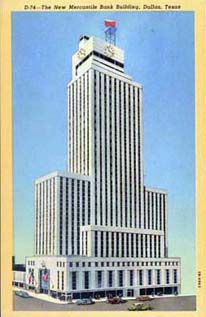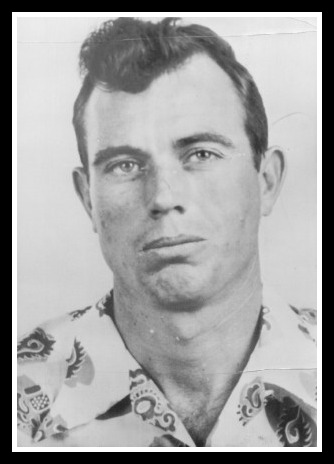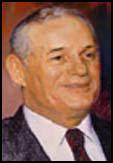This is part 2 of the interview with John Curington. See Billionaire Logic and the Death of JFK for the introduction and background this series. (Greg Doudna has posted a link to the full interview on his academia.edu page.)
It is interesting to compare today’s events with “fake news” and its correlation with criminal violence.
~ ~ ~
GD: So then we come to—Kennedy is assassinated.

JC: Yeah. At the time Kennedy came to Dallas in November ’63, our offices—when I say our I mean Hunt Oil company offices—were in the Mercantile Bank Building there in Dallas. And the Mercantile Bank Building had windows that were about four by six foot in dimensions, and you could raise them up and be exposed without a screen or anything. And when the Kennedy caravan passed our offices on the day of the assassination, Mr. Hunt and I were in the window looking out, and John Connally was in the front seat of the limousine in which Kennedy was a passenger. He turned up and looked at our building and recognized Mr. Hunt, and he turned around and made a comment to Jack Kennedy. And Kennedy in turn turned up and waved to Mr. Hunt there. So I think there was a recognition of Mr. Hunt on the parade route looking out his office window and being recognized by both John Connally and John Fitzgerald Kennedy there.
GD: You were standing right there with Mr. Hunt?
JC: Yeah, he and I were—in fact I’ve seen one clip, that I can recognize myself in that window and Mr. Hunt is standing by me there. But it has to be <unintelligible> personal recognition, which was more of an important issue there.
He and I were looking at—then I received a telephone call, I would say within three or four minutes of the shooting. And the person that called me stated that they had just heard that there had been a shot fired at John Kennedy. And I told that person that was impossible, because I had just seen him pass the window three or four minutes before, and that was impossible. But I had a TV in my office, and I did go over to my office and turn the TV on. And after a few minutes there was an interruption in the program, and it, the interruption, stated that yes there had a been a shot fired, and they at that time did not know where the shot was fired, who was hit, or what was involved with it, but as the story unraveled it became clear that yes, Kennedy had been shot, and yes, it was a fatal shot.
GD: Do you recall Mr. Hunt’s reaction to the news?
JC: I don’t think there was any visible reaction. He shared the same view that I did. He did not have a TV in his office. But after the program began to get interrupted with the story, then Mr. Hunt did come into my office and did sit down in a chair and watch the news. But I don’t remember him making any comment one way or the other, as to what was happening or not happening.
GD: But you said he did not make comments very much on things—
JC: No, no.

GD: Then—Officer Tippit was shot, and Lee Harvey Oswald was arrested in the movie theatre, and this was on a Friday afternoon—
(J. D. Tippitt, 1924-1963, was a Dallas police officer who was shot to death in another part of the city an hour after the Kennedy assassination, by an assailant described as matching Oswald’s description near to and immediately prior to Oswald’s arrest in a movie theatre.)
JC: Yes.
GD: And then the Dallas police—he was being questioned by Captain Fritz—
JC: Yeah. Will Fritz, he was Captain, head of the Homicide Division of the Dallas Police Department.
GD: Did you know Captain Fritz?
JC: Yes. I knew him, was on a first-name basis with him.
GD: Did you know others in the police department pretty well?

JC: Well, I guess my best contact, we tried to keep pretty good contact with all the law enforcement people, but I guess my best contact would have been Lieutenant George Butler. He was a frequent visitor to our office, and I was able to do some things for George Butler that he was appreciative of me being able to do, that—nothing illegal or unethical about it—but we just developed a pretty close working relationship. And I was able to call upon him for information, or his assistance on anything that I needed a little help on.
(“A friend of the late H. L. Hunt, Butler was a confidante of the famed oil tycoon and handled personal investigative assignments for Hunt Oil.”8 Butler is said to have been the officer in charge, under Captain Fritz, of the Oswald transfer in the basement of the Dallas Police Department in which Oswald was killed on Sunday morning, Dec. 24, 1963.)
GD: Then there’s the story that’s been partly reported in the past, that Mr. Hunt asked you to go to the police station and check on the security of Oswald.
JC: Well, there’s a little bit more to that story than just, you know, going down to check on security. Of course at that time Mr. Hunt was a very well-known person, in wide circles, but was well known in the Dallas area, and was well known by a lot of people who listened to his political views. And when the accident happened with John Fitzgerald Kennedy, Mr. Hunt immediately started getting threatening, what I would call threatening telephone calls, in the sense that they would be badmouthing Mr. Hunt for badmouthing the President on previous Life Line programs. Nothing more than what I would say random calls from people who shared different political views. But after you get several of those over a short period of time you become a little bit concerned with what their next step might be there.
GD: So Mr. Hunt was getting threatening calls—
JC: Yeah.
G: And did that have anything to do with him asking you to go check the security of Oswald?
JC: Well, I think so. Because immediately after the assassination, everything started off in slow motion, as far as publicity and information being distributed. On a minute-to-minute basis that information was being upgraded, changed, altered, but presented in a different light. So I think that continuous new information just encouraged people to more and more call Mr. Hunt, expressing their frustration that, one, could he have been involved in the assassination? And two, did he feel any remorse by putting out programs that were detrimental to the Kennedy political agenda there? So Mr. Hunt was nothing more than a person that people could and would express their indication, you know, their concern over him being involved in anything that could have affected the president there.
In my opinion it was nothing more than a normal reaction, you know, to any given set of an event that had worldwide exposure, and of interest to almost every person in the United States.
GD: In Mr. Hunt’s view did he maybe wonder if his Life Line program had incited the assassination?
Continue reading “Billionaire Logic and the Death of JFK / 2 —”
